- Home
- Muriel Jensen
Jackpot Baby Page 3
Jackpot Baby Read online
Page 3
“Maybe someone came in,” he said, stopping in front of the carrier and staring, “and maybe they left when I didn’t come out, but…but…”
“But, what?” Shelly leaned an elbow on the counter and looked into the front of the carrier. A fat-cheeked baby with bright blue eyes smiled gummily at her.
“But they didn’t take the baby out,” Dan said unnecessarily.
Chapter Two
“Oh, Dan!” Shelly exclaimed in a whisper. “Forgetting your baby carrier seems strange enough, but forgetting your baby?”
At her expression of indignation, the baby’s smile crumpled and he began to cry. Both little arms went up in agitation and Dan reached for a piece of paper tied to the blue-and-white crocheted blanket with a diaper pin.
“Oh, no. No, baby. Don’t cry.” Shelly took a tiny hand in hers and shook it playfully as Dan opened the note. “It’s okay. Don’t get upset. I’m sure your mom will be right back.”
Dan shifted his weight as he read. “Well, you’re wrong about that,” he said with a sigh. “Somebody left you this baby.”
“What?”
The baby shrieked at her loud exclamation and Shelly pulled him out of the carrier, blanket and all, and held him to her chest where he screamed in her ear.
“‘Please take care of Max,’” Dan read loudly over the baby’s screams. “‘I know you can give him all the love and money any little boy could need. Tell him I love him and I’m sorry.’”
“Sorry?” Shelly said in agitation. “Sorry? She leaves a helpless little baby in an empty coffee shop and she’s sorry? You poor baby!” She held the screeching baby tightly to her and paced back and forth behind the counter, Dan staring at her in concern.
“Call the sheriff,” he said. “He’ll get a caseworker from Pine Run to come get him.”
Shelly paced and shushed and talked nonsense, something she was surprised she knew how to do. Working with her parents in the coffee shop had left little time for the baby-sitting experience most other girls had acquired. But she found herself pressing her cheek to the baby’s hot cheek and patting his back. She noted that the scent of roses clung to him.
“He’s so small,” she said as the sobs quieted somewhat.
Dan nodded. “Most babies are.”
“How old do you think he is?”
He shrugged. “It’s been so long since mine were that size. I’d say maybe six, seven months.”
Even in her concern, Shelly was aware that there was something comfortable, comforting about the weight of the baby in her arms, about the little heart beating against her own.
She looked down into the unhappy little face, feeling a connection being made. Bright blue eyes looked back at her, a big tear perched on a bottom lid, stuck there. Max looked her over gravely then took a fistful of her hair. He studied it, then opened his mouth like a little bird and tried to bring the hair to it.
“Ouch. Ow.” Shelly offered him her index finger instead. “Here, take this. It’s used to being scraped and burned and otherwise abused.”
Max took it, put sharp little gums to it, then leaned sideways against her with a little piglet sound of contentment.
An urgent, protective feeling raged through her, taking every nurturing inclination she’d ever had and squaring it to make her feel—oh, God—maternal.
For a moment she felt as though a pair of giant hands had shaken her, disturbed her whole being and her world, then set her down again. Absently she saw through the window that snow had begun to fall.
Great, she thought. Shelly Rose Dupree, millionairess, caught in a snow globe.
No! she thought fiercely. No, no, no! This was probably just some passing sensation every girl or woman experienced when she held a baby. But this baby wasn’t hers. Someone had left it to her, but she was sure she’d change her mind in a heartbeat and be right back—probably before they even closed the coffee shop.
And she was not a candidate for motherhood. She loved children, sure, but she worked six long days a week, and she finally had some money to go places and do things. She couldn’t take care of a baby.
Dan was right. She had to go see Luke McNeil, the sheriff.
There. The maternal feeling left as quickly as it had come. The past two weeks had been such an emotional roller coaster. She was just stressed. Not to mention shocked by having a baby left on the counter of her coffee shop.
“Okay.” She tried to put Max back in the carrier, but he began to scream again, so she held him in her arms instead. “I’m going to see Luke. I hope he’s in his office, and not out on a call. Can you close up for me? Put the soup in the fridge? I’ll come in early and prep in the morning.”
“Sure.” Dan helped her into her coat, then took the gray sweater she kept in the back and wrapped it also around the baby. “Are you going to be okay? You need me to come?”
“I’ll be fine,” she said. “You take care of things here. Oh.” She pointed to the purse she’d left on the table in the first booth when she came in. “Take that envelope sticking out with your name on it, and put the purse on my shoulder.”
He did as she asked, then studied the envelope as he walked her to the door. “What’s this?”
“Open it when you get home,” she directed, then walked out into the snow, wrapping her coat around the baby. The sheriff’s office was kitty-corner from The Brimming Cup.
As she waited to cross the street, Shelly became aware that Luke was not out on a call, but he did seem to be having some kind of problem. She could see his tall, strong, uniformed body in the middle of a throng of people holding placards. They were marching around him and shouting.
No News Is Good News! she noticed one of the signs read as the sudden disappearance of traffic allowed her to cross diagonally. Other signs read, Clear Out Of Jester! Go Bother Somebody Else! Money Talks. It Says, Get Out Of Jester! Dean Kenning was carrying that one, but he was smiling. She had a feeling he’d joined the crowd out of amusement rather than any serious disapproval of the presence of the news media.
Shelly pushed her way through the crowd to approach Luke. He was tall and dark and had Native American ancestors. “Can I talk to you for a minute?” she asked.
“If you’re going to complain about the press,” he said with a long-suffering sigh, “it’s been taken care of. And then some.”
“I wasn’t,” she assured him.
He looked surprised. “But you hate them.”
“Yes, but I also realize we’re news and that pretty soon we won’t be and they’ll all go away. Luke, can we talk?”
“Sure.” He caught her arm and, opening his office door, pushed her gently inside. Then he turned to the protestors and said firmly, “You keep your voices down and stay out of the street.”
Several nodded and everyone kept marching.
Luke closed the door behind him. He had a small, cluttered office, but in the past six years that he’d occupied it, he’d solved Jester’s problem of nighttime vandalism, and two years ago he had caught a pair of prisoners who’d escaped from Folsom and were considered armed and dangerous. He had a toughness appropriate to his position, but he was a very nice man. At the moment, however, he was understandably preoccupied with the marchers and she needed him to focus on finding a solution to this baby.
He stopped in the middle of the office and turned to her. “What is it?”
She shifted her weight impatiently. “Luke!” She pointed to Max. “Have you completely failed to notice that I have a baby in my arms?”
He frowned at that, apparently unsure of her point. “I noticed. Whose is it?”
“I don’t know!” she snapped at him. “Someone left him in the coffee shop. Can you check if someone’s reported a baby missing?”
“No babies missing. What do you mean someone left it? How do you leave a baby?”
“They just did. I went to the bank to deposit my check and when I came back…” She handed him the note. “I can’t have a baby. You have to call whoever in Pine R
un takes care of abandoned children.”
Max squirmed and fussed and she moved him into her left arm, hoping to placate him.
“You’re not making sense,” he said. “If you knew someone left this note with him, why did you ask if there were babies missing?”
“I don’t know. Just desperate. I thought maybe someone stole him, then decided they didn’t want him after all.”
He considered that, then nodded as though that might be possible. “I’ll check again. Meanwhile—” he put his fingertips to the baby’s cheek “—he feels hot.”
“Oh, no.” She’d noticed that earlier, but it hadn’t registered as a problem. “Do you think he’s sick?”
He shook his head. “I don’t have much firsthand experience with babies, except for having delivered a few. Why don’t you take him to the medical center and have the doc check him out, and I’ll see if I can round up somebody from Child and Family Services.”
“Good idea.” As Luke picked up the phone, Shelly went outside again, sheltering the now-screaming baby against her body. The protestors parted ranks to let her through and she hurried across the street, down the block and around the corner.
Nathan Perkins was the quintessential family doctor. He was a loving husband, devoted father of three, and a friend as well as physician to most patients he saw. He deserved the respect everyone in Jester gave him.
But Nathan wasn’t there, according to the young redheaded receptionist, who led her to a small examining room. Standing in for him was a tall, slender man with rich brown hair and a pair of gold-green cat’s eyes that put her on the edge the moment she looked into them. They looked her over, went to the screaming baby in her arms, then back to her eyes with a disapproval that confused her.
But she didn’t have time to think about it. She held Max out to the doctor. “Please,” she said. “Is something wrong with him?”
He took the baby, his large hands covering the baby’s torso. He walked around with him, putting a hand to his forehead and his cheek.
“Has he had his DPT shots?” he asked.
“Ah…?”
“Diphtheria, tetanus, pertussis vaccine,” he explained.
“I don’t know,” she replied.
“His HI?”
“Um…?”
“Hemophilus influenzae B.”
“I don’t know. I run The Brimming Cup and he was…”
“When did this start?” he interrupted.
“I just noticed it in the sheriff’s office when…”
Those eyes looked into hers again and stopped her cold. “Did you try baby aspirin?”
“No, I…”
“Cool bath?” He’d taken out a stethoscope and was listening to Max’s heart while the baby latched on to the instrument.
“No, I told you I was in the sheriff’s…”
He held a finger up for quiet as he listened. Then he removed the stethoscope, put it out of the baby’s reach, and asked with another direct glance into her eyes that had an angry quality to it she didn’t understand, “Do you know what he weighs?”
“No, I don’t. I…”
He leaned a hip on the examining table and held the baby to him, stroking his back and shushing him. He pointed her to the room’s only chair.
She sat, her mind a whirl of the afternoon’s shocking events and the doctor’s inexplicably aggressive behavior.
“This baby is supposed to be your first priority,” he said in a voice that had gentled only slightly and sounded as though it intended to preach. She suddenly realized what he must be thinking.
“Doctor, I’m…”
“How can you not know whether or not your baby’s been immunized?” he interrupted again. “How can you not know what he weighs? How can you have a baby and pursue a lifestyle that lands you in the sheriff’s office?”
She sprang to her feet again, tired of his accusations, whatever he thought.
“Because I’m not his mother!” she shouted at him. “He was abandoned in my restaurant by someone who left a note, saying she knew I could take care of him because I’m one of the winners of the lottery!”
He had the grace to look surprised, though not particularly apologetic. So she went on.
“And I was in the sheriff’s office because going to the authorities seemed to be the thing to do when you find an abandoned baby. What would you have done? Simply shouted at the baby like you shout at your patients?”
EVEN CONNOR COULD AGREE that he had that coming. He should have asked before he took on an accusatory approach to her parenting. But he’d seen so much child neglect and abuse in Los Angeles, where he came from, that he’d become a warrior in defense of children. And sometimes that meant getting mean with parents.
“No,” he replied with a half smile. “I never yell at babies. I’m sorry. I mistook you for one of those women for whom the fuzzy glow of motherhood had worn off. When you couldn’t answer any of my questions, I thought you’d lost interest in your baby.”
That honest admission seemed to defuse her anger, but only a little. She blinked wide, darkly lashed hazel eyes at him. “Well, maybe you should have asked.”
He nodded. “Maybe I should have.”
That might have defused her anger a little more, but he could see in her eyes that she resisted forgiving him. He’d hurt her feelings after all. She was another touchy hybrid like Lisa had been. She angled her chin, short, straight, glossy brown hair catching the light.
“Can you tell me what’s wrong with him?” the woman asked, folding her arms, apparently determined to keep him at a cool distance.
That was fine with him.
“Actually, I think he’s just teething,” he said, putting his index finger into the baby’s mouth. The baby sucked on it like a little vacuum. “You can feel the two central incisors just about to pop through. Here. Feel.”
She gave him a disdainful look, then came closer and put her finger in the baby’s mouth. “Oh.” She smiled at the baby. “You’re getting teeth, Max.”
The baby laughed at her.
In all his years of internship, residency and practice, Connor had yet to see an ugly baby, but this little guy had a winning way as well as pink cheeks and bright blue eyes.
“I can’t imagine anyone being able to just leave him and walk away,” she said, her disapproval finally aimed away from him and toward the baby’s mother.
“I know.” He handed the baby back to her. “But I worked at an inner-city hospital in L.A. and I saw it all the time. And as incredible as it is, it’s a better choice for the child than those who keep their babies then can’t deal with them. You might give him a cold, wet washcloth to chew on, or freeze a bagel he can gnaw on. Just make sure he doesn’t get a piece off and choke on it. Over-the-counter teething solutions help a little, too.”
She held the baby to her and wrapped him up. “I can’t have a baby,” she said a little defensively. “I’d love to have one, but I work all the time.” She looked at him as though she expected censure.
Instead, he nodded. “Some lifestyles just don’t allow it.”
“It’s not a lifestyle choice,” she said, her defensive tone a little edgier. “I mean, I’m going to have money now. I wouldn’t have to keep the coffee shop, but it was my parents’, you know, and I grew up in it. I watched them pour their hearts into it. I can’t just sell it and move on.”
He didn’t know why she seemed to need his agreement, but she did.
“I understand,” he said.
Apparently she didn’t think he could. “I’ve never heard of you,” she said, rocking the baby as he began to fuss. The words suggested that was his problem rather than hers. “Do you live here, or are you just helping out?”
“I went to medical school with Nathan,” he replied, opening the examining-room door for her. “I visited last summer, and he told me if I wanted to come back, he’d give me a job. I liked it here, so I took him up on it. This is my third day as a resident of Jester.”
; “Well…learn to soft-pedal that aggression,” she said, stepping out into the hallway. “Most of the people here are kind and neighborly and good to their children.”
She offered the advice seriously. He took it humbly, eager to send her on her way so that he could put in his last hour here, get something to eat and go to his bed—such as it was. He’d been sleeping on a cot in the storage room upstairs until he found a place to live.
“Hey, Doc. How’re you liking Jester?” Luke McNeil stood in the waiting room, hat in hand, chatting with Carlie Goodwin, the receptionist. She went back to work when Connor claimed Luke’s attention.
Connor had been on call the night before, and the sheriff had brought him a teenager he’d picked up for drunk driving. The kid had cut himself on broken glass in a fall while trying to escape. Connor had liked McNeil and his caring but no-nonsense approach to law enforcement.
Connor went forward to shake hands with him. “I’m doing fine, Sheriff. Too bad about this little guy.”
McNeil looked alarmed. “Is he sick?”
“No,” Connor assured him. “I meant, it’s too bad somebody abandoned him and left him to the mercies of the system.”
“Yeah, well, the system’s not working too well at the moment.” He frowned in concern. “Every time the wind picks up around here, the phone lines go down. We have virtually no cell phone reception. I can’t get through to Pine Run to get a caseworker here.” He turned a subtly pleading look on Shelly.
She began to fidget. “I can’t, Luke. I’ve never taken care of a baby. I wouldn’t know what to do. A couple of hours would be one thing, but through the night? I…I…”
As though on cue, the baby grabbed a fistful of her hair, yawned mightily, blinked deeply several times, then fell asleep on her shoulder.
Connor had never seen a woman look so terrified at the prospect of caring for a baby. What he’d taken for lack of enthusiasm about her baby when he’d thought she was his mother was apparently just inexperience. Or possibly simple unwillingness to deal with babies.

 Christmas In The Country
Christmas In The Country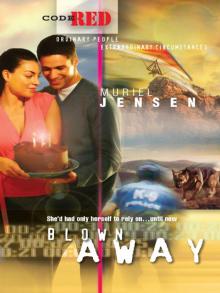 Blown Away
Blown Away In My Dreams
In My Dreams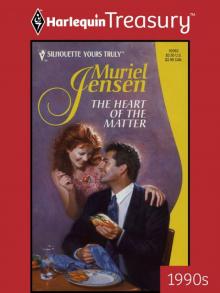 The Heart of the Matter
The Heart of the Matter New Year's Wedding
New Year's Wedding Always Florence
Always Florence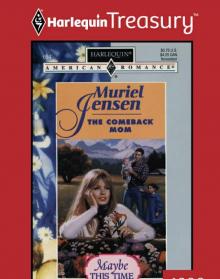 The Comeback Mom
The Comeback Mom To Love and Protect
To Love and Protect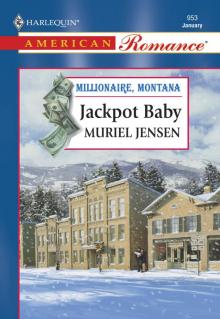 Jackpot Baby
Jackpot Baby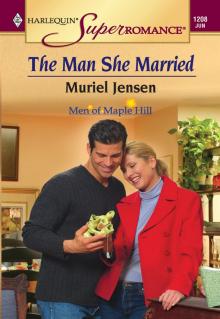 The Man She Married
The Man She Married Love Me Forever
Love Me Forever